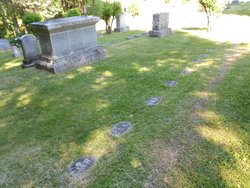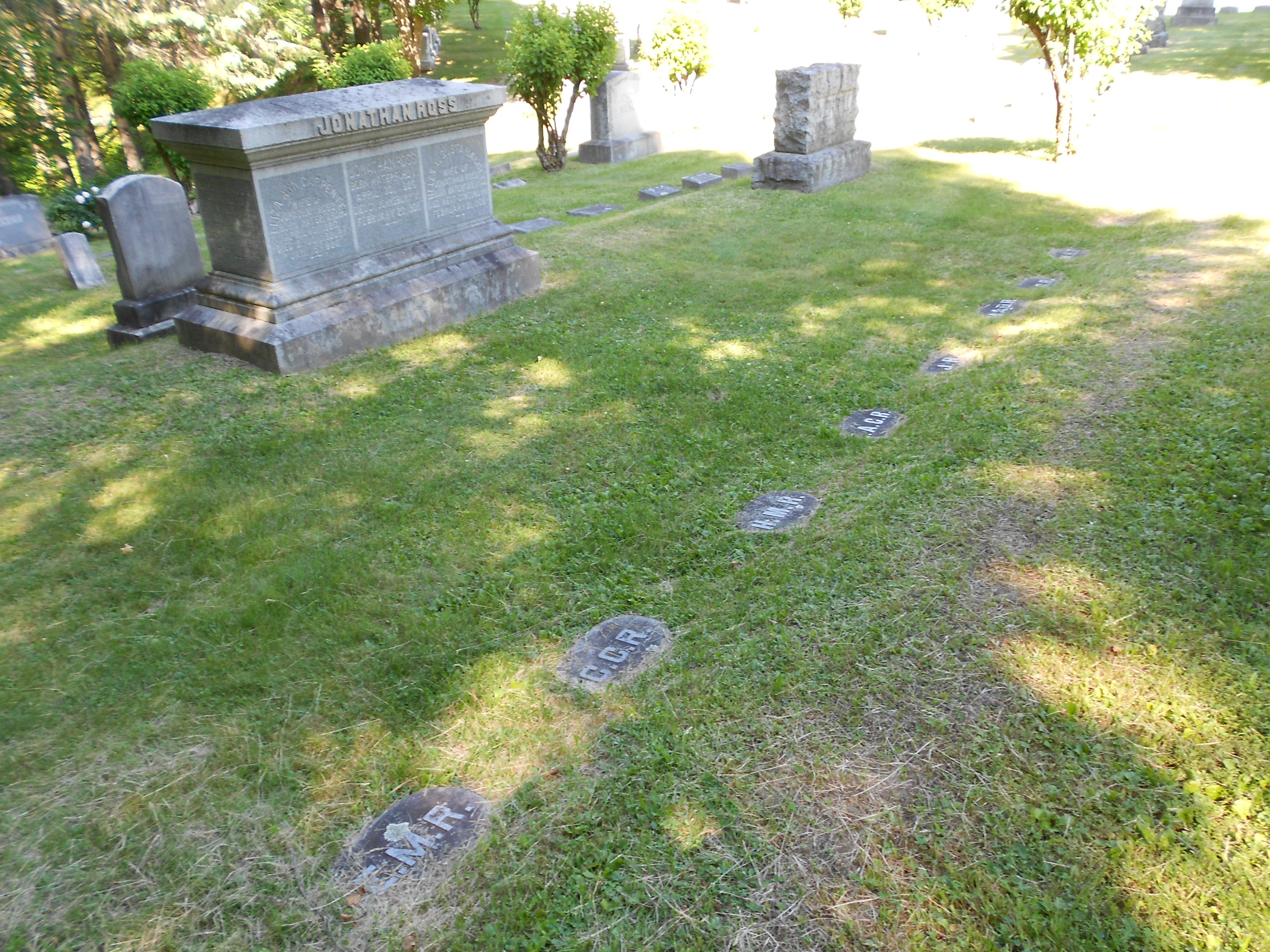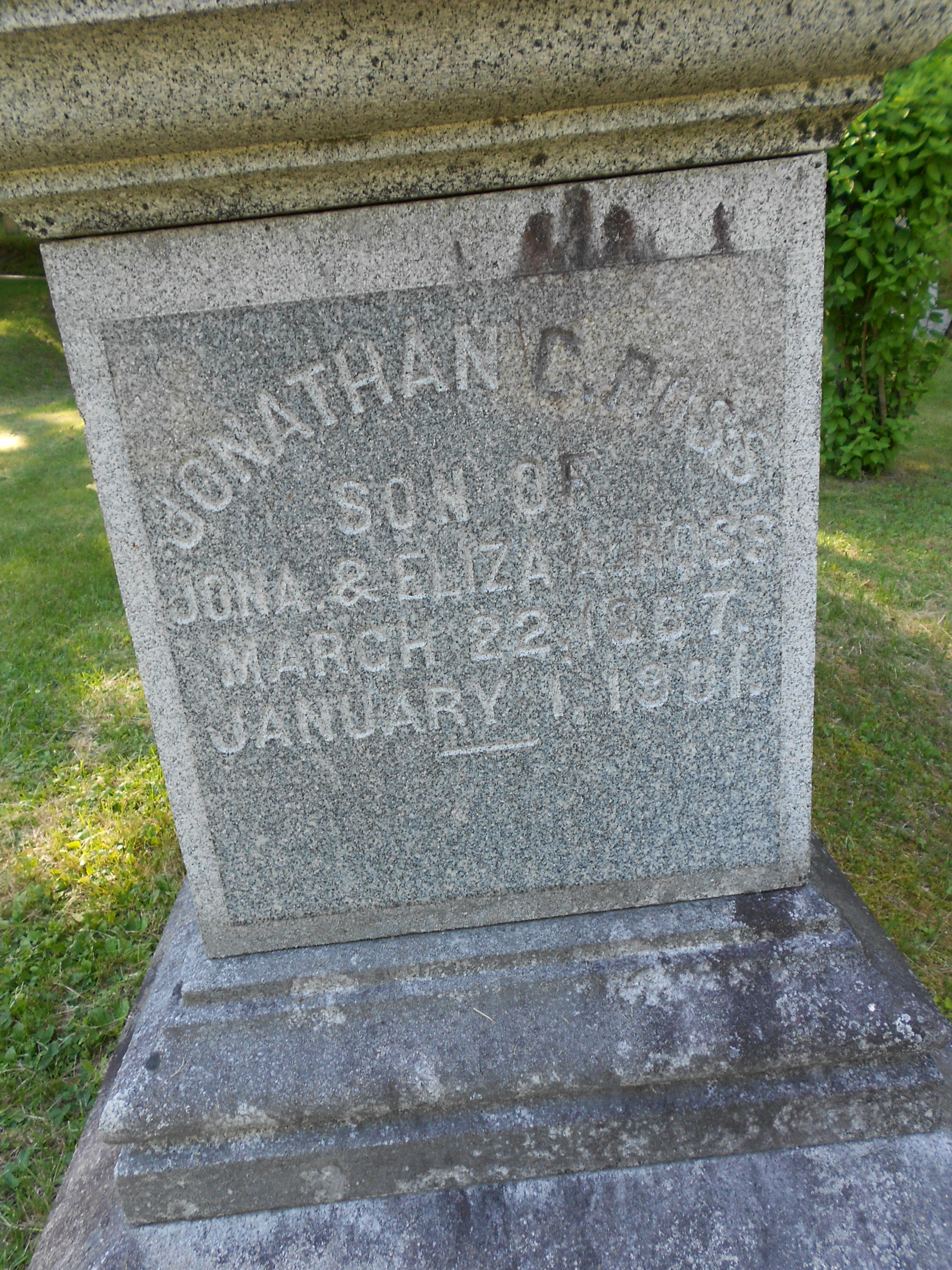NEW-YORK TRIBUNE DATED JANUARY 2, 1901
Jonathan Carpenter Ross, a lawyer and the son of ex-United States Senator Jonathan Ross of Vermont, died from pneumonia at a private hospital in this city last evening. Mr Ross was born at St Johnsbury, Vermont in 1868. He was graduated with honors from St Johnsbury Academy. He then entered Dartmouth College, and was graduated salutatorian of his class in 1889. While in college he received honors in the English and the Latin courses. After graduation from Dartmouth Mr Ross entered the Columbian Law School at Washington D.C., and received from that institution the degree of LL.B. in 1891. He came to this city in 1891 and began the practice of law. Mr Ross was a member of the Bar Association of New-York City, the Phi Beta Kappa Society, the Delta Kappa Epsilon Fraternity, treasurer of the Dartmouth College Alumni Association of New York, and identified with the work of the West Side Branch of the Young Men's Christian Association.
The burial will probably be in St Johnsbury.
St. Johnsbury Caledonian. volume (St. Johnsbury, Vt.), 16 Jan. 1901
Tributes to the late J.C. Ross
At the request of the Caledonian we received two tributes to the life and work of the late Jonathan C. Ross which we are sure will be read with interest by the many friends of the subject of this sketch. The first is by a college classmate and close friend and the other by one who knew him well in his professional work.
One of the characteristics of his nature was a noble bigness that had in it no room for the small meannesses of Human Nature. He never seemed to cherish ill feeling for anyone – even when he knew himself wronged. Small and petty annoyances never provoked him to resentment, for his nature so lovable and gentle seemed proof against the trifling vexations of life. Not that his personality was colorless, for he could be indignant when the occasion demanded, but that quality of his nature was more easily aroused in the defense of others, than in his own behalf.
I do not believe he ever had an enemy. His consideration for the feelings and wishes of his associates made him ever willing to defer to them in matters involving no principle’s, but his sense of right and fairness was so strong and unyielding that it never permitted him to compromise with what he believed to be wrong. He had a keen and delicate sense of humor – but it was always kind, never bitter – even when levelled at exaggeration, sham or pretense for all forms of which his dislike was instinctive and cordial. Though undemonstrative his nature was so gentle and lovable and his modesty so wholly unconscious of its own merits that he made friends whereever he went. His powers were maturing rapidly, and had his life been spared he must have risen to a high place among the leaders of his profession. To his intimate friends, who knew and loved him so well, his brief life will ever be an inspiration and a stimulating example because of it’s winning gentleness, its purity and its noble ambitions. His life was serene and beautiful throughout and when he came to lay it down, there was nothing in it to be regretted, explained or wished undone.
Jonathan Carpenter Ross began the practice of the law in New York city in 1891. He at once showed great aptitude for his chosen profession. From the very beginning of his career, important matters were placed in his charge, which he handled with a practical ability, unusual in so young a man. From that time until his death his development as a lawyer and as a practical man of affairs, was continuous and marked. He had established a large and steadily increasing business.
He possessed the confidence of his friends and business acquaintances to a very remarkable degree. No one who became his client ever left him. To become his client was also to become his warm personal friend, as was illustrated on many occasions. His word could always be relied upon to the fullest extent, of its spirit as well as letter. He had the highest sense of honor, both in professional and private relations.
At the time of his death he had become known as a first-class lawyer. He was well grounded in the principles of the law, accurate and versatile in their application, quick to take a proper advantage of his adversary, in or out of court, and he had that best of all endowments for a practicing lawyer – clear headed, practical common sense, and a willingness and capacity for hard work.
He would have made an ideal judge and would undoubtedly have reached the bench in a few years if political conditions made it possible. He had a judicial mind and was enabled to see not only his client’s side of the controversy, but the other as well, and his advice was for this reason, in many cases, the mere valuable.
“He had the respect of everyone, who knew him – client, opponent, professional associate, or antagonist – everyone. Few have had as many warm friends, none a less number of enemies – it is doubted if he had one.”
“He was tenacious of his views, he had the proper amount of pugnacity; he was not content to stay beaten in the court of first instance and argued many appeals. In his litigated cases he had more than a fair amount of success.
His name appears frequently in the reports of the Court of Appeals and the General Term and Appellate Division since 1891. One of his last arguments to an appellate tribunal was in December, 1900, in the case of Prunier vs. Ash, in the Unites States Circuit Court of Appeals. An opinion in favor of his client, affirming a $15,000 verdict, for alienation at affections, was handed down on January 4th, three days after his death.
A few weeks previously he presented to the Appellate Division in New York City, an appeal on behalf of two National banks in an important creditor’s action, involving some novel and interesting questions. He was a close student of the law and kept pace with the decisions of the courts in which he practiced. He was a member of the Bar Association of the City of New York, and spent a great deal of time in its library. He was a safe and conscientious counsellor. His advice could always be relied upon. In doubtful cases his tendency was to effect compromise. He led his clients out of difficulties, rather than into them. He was conservative in his views, yet when the occasion seemed to demand it, he did not hesitate to take radical action.”
NEW-YORK TRIBUNE DATED JANUARY 2, 1901
Jonathan Carpenter Ross, a lawyer and the son of ex-United States Senator Jonathan Ross of Vermont, died from pneumonia at a private hospital in this city last evening. Mr Ross was born at St Johnsbury, Vermont in 1868. He was graduated with honors from St Johnsbury Academy. He then entered Dartmouth College, and was graduated salutatorian of his class in 1889. While in college he received honors in the English and the Latin courses. After graduation from Dartmouth Mr Ross entered the Columbian Law School at Washington D.C., and received from that institution the degree of LL.B. in 1891. He came to this city in 1891 and began the practice of law. Mr Ross was a member of the Bar Association of New-York City, the Phi Beta Kappa Society, the Delta Kappa Epsilon Fraternity, treasurer of the Dartmouth College Alumni Association of New York, and identified with the work of the West Side Branch of the Young Men's Christian Association.
The burial will probably be in St Johnsbury.
St. Johnsbury Caledonian. volume (St. Johnsbury, Vt.), 16 Jan. 1901
Tributes to the late J.C. Ross
At the request of the Caledonian we received two tributes to the life and work of the late Jonathan C. Ross which we are sure will be read with interest by the many friends of the subject of this sketch. The first is by a college classmate and close friend and the other by one who knew him well in his professional work.
One of the characteristics of his nature was a noble bigness that had in it no room for the small meannesses of Human Nature. He never seemed to cherish ill feeling for anyone – even when he knew himself wronged. Small and petty annoyances never provoked him to resentment, for his nature so lovable and gentle seemed proof against the trifling vexations of life. Not that his personality was colorless, for he could be indignant when the occasion demanded, but that quality of his nature was more easily aroused in the defense of others, than in his own behalf.
I do not believe he ever had an enemy. His consideration for the feelings and wishes of his associates made him ever willing to defer to them in matters involving no principle’s, but his sense of right and fairness was so strong and unyielding that it never permitted him to compromise with what he believed to be wrong. He had a keen and delicate sense of humor – but it was always kind, never bitter – even when levelled at exaggeration, sham or pretense for all forms of which his dislike was instinctive and cordial. Though undemonstrative his nature was so gentle and lovable and his modesty so wholly unconscious of its own merits that he made friends whereever he went. His powers were maturing rapidly, and had his life been spared he must have risen to a high place among the leaders of his profession. To his intimate friends, who knew and loved him so well, his brief life will ever be an inspiration and a stimulating example because of it’s winning gentleness, its purity and its noble ambitions. His life was serene and beautiful throughout and when he came to lay it down, there was nothing in it to be regretted, explained or wished undone.
Jonathan Carpenter Ross began the practice of the law in New York city in 1891. He at once showed great aptitude for his chosen profession. From the very beginning of his career, important matters were placed in his charge, which he handled with a practical ability, unusual in so young a man. From that time until his death his development as a lawyer and as a practical man of affairs, was continuous and marked. He had established a large and steadily increasing business.
He possessed the confidence of his friends and business acquaintances to a very remarkable degree. No one who became his client ever left him. To become his client was also to become his warm personal friend, as was illustrated on many occasions. His word could always be relied upon to the fullest extent, of its spirit as well as letter. He had the highest sense of honor, both in professional and private relations.
At the time of his death he had become known as a first-class lawyer. He was well grounded in the principles of the law, accurate and versatile in their application, quick to take a proper advantage of his adversary, in or out of court, and he had that best of all endowments for a practicing lawyer – clear headed, practical common sense, and a willingness and capacity for hard work.
He would have made an ideal judge and would undoubtedly have reached the bench in a few years if political conditions made it possible. He had a judicial mind and was enabled to see not only his client’s side of the controversy, but the other as well, and his advice was for this reason, in many cases, the mere valuable.
“He had the respect of everyone, who knew him – client, opponent, professional associate, or antagonist – everyone. Few have had as many warm friends, none a less number of enemies – it is doubted if he had one.”
“He was tenacious of his views, he had the proper amount of pugnacity; he was not content to stay beaten in the court of first instance and argued many appeals. In his litigated cases he had more than a fair amount of success.
His name appears frequently in the reports of the Court of Appeals and the General Term and Appellate Division since 1891. One of his last arguments to an appellate tribunal was in December, 1900, in the case of Prunier vs. Ash, in the Unites States Circuit Court of Appeals. An opinion in favor of his client, affirming a $15,000 verdict, for alienation at affections, was handed down on January 4th, three days after his death.
A few weeks previously he presented to the Appellate Division in New York City, an appeal on behalf of two National banks in an important creditor’s action, involving some novel and interesting questions. He was a close student of the law and kept pace with the decisions of the courts in which he practiced. He was a member of the Bar Association of the City of New York, and spent a great deal of time in its library. He was a safe and conscientious counsellor. His advice could always be relied upon. In doubtful cases his tendency was to effect compromise. He led his clients out of difficulties, rather than into them. He was conservative in his views, yet when the occasion seemed to demand it, he did not hesitate to take radical action.”
Family Members
Sponsored by Ancestry
Advertisement
Records on Ancestry
Advertisement











